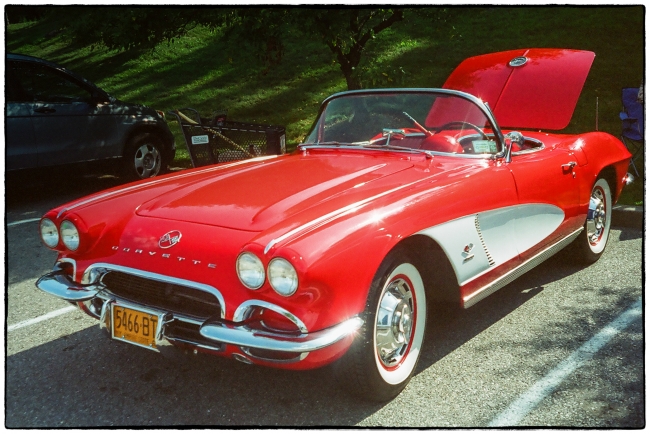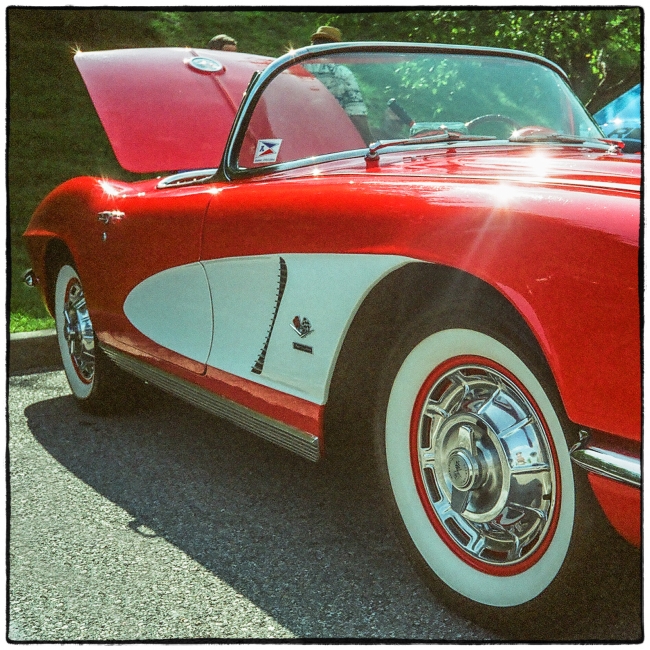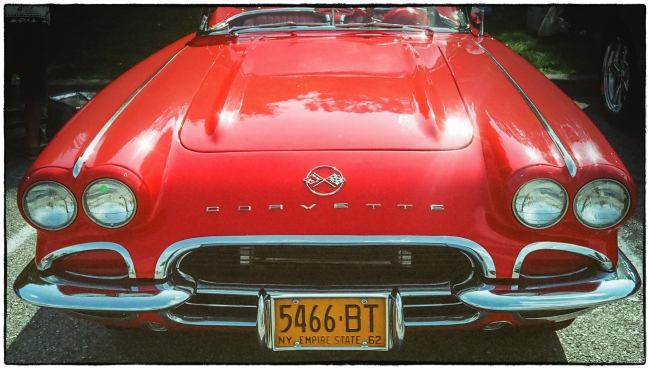We’d been to Home Depot in Brewster and decided to stop at the nearby DeCicco Market to pick up some groceries. There was a small vintage car show in the parking lot and since I had the Olympus Infinity Stylus (Mju) with me I decided to take a few pictures. One was of this bright red corvette.
Although I love the look of vintage cars I know very little about them. However, after a bit of research I think this one is from the late 1950s/early 1960s – possibly the 1958 model.
According to Wikipedia:
The first generation of Corvette was introduced late in the 1953 model year. Originally designed as a show car for the 1953 Motorama display at the New York Auto Show, it generated enough interest to induce GM to make a production version to sell to the public. First production was on June 30, 1953.
This generation was often referred to as the “solid-axle” models (the independent rear suspension was not introduced until the second generation). Three hundred hand-built polo white Corvette convertibles were produced for the 1953 model year.
The 1954 model year vehicles could be ordered in Pennant Blue, Sportsman Red, Black, or Polo White. 3,640 were built, and sold slowly.
The 1955 model offered a 265 cu in (4.34 L) V8 engine as an option. With a large inventory of unsold 1954 models, GM limited production to 700 for 1955. With the new V8, the 0-60 mph time improved by 1.5 seconds.
1956 Chevrolet Corvette transistorized “hybrid” (vacuum tubes and transistors) car radio option
A new body was introduced for the 1956 model featuring a new “face” and side coves; the taillamp fins were also gone. An optional fuel injection system was made available in the middle of the 1957 model year. It was one of the first mass-produced engines in history to reach 1 bhp (0.75 kW) per cubic inch (16.4 cubic cm) and Chevrolet’s advertising agency used a “one hp per cubic inch” slogan for advertising the 283 bhp (211 kW) 283 cu in (4.64 L) Small-Block engine. Other options included power windows (1956), hydraulically operated power convertible top (1956), heavy duty brakes and suspension (1957), and four speed manual transmission (late 1957). Delco Radio transistorized signal-seeking “hybrid” car radio, which used both vacuum tubes and transistors in its radio’s circuitry (1956 option).The 1958 Corvette received a body and interior freshening which included a longer front end with quad headlamps, bumper exiting exhaust tips, a new steering wheel, and a dashboard with all gauges mounted directly in front of the driver. Exclusive to the 1958 model were hood louvers and twin trunk spears. The 1959–60 model years had few changes except a decreased amount of body chrome and more powerful engine offerings.
In 1961, the rear of the car was completely redesigned with the addition of a “duck tail” with four round lights. The light treatment would continue for all following model year Corvettes until 2014. In 1962, the Chevrolet 283 cu in (4.64 L) Small-Block was enlarged to 327 cu in (5.36 L). In standard form it produced 250 bhp (190 kW). For an extra 12% over list price, the fuel-injected version produced 360 bhp (270 kW), making it the fastest of the C1 generation. 1962 was also the last year for the wrap around windshield, solid rear axle, and convertible-only body style. The trunk lid and exposed headlamps did not reappear for many decades.



